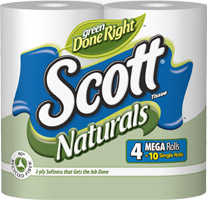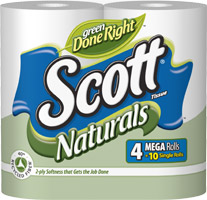If a huge coal power plant goes next door and sets up a cute little boutique collection of five solar panels, have your basic feelings about that giant coal power plant changed? Probably not. After all, you’re reading Grist.
But what if said coal company releases advertisements announcing that they’ve “gone solar,” complete with misleading close-up pics of those cute solar panels? Enough people might fall for it to make the ads worthwhile.
Call it the cute little dollhouse effect: a nasty company builds a cute, green dollhouse version of their house, takes misleading pics suggesting that the dollhouse is the real house, and then declares itself a cute little green company.
Ladies and Gentlemen, gargantuan loggovore Kimberly-Clark has built itself a cute little dollhouse!
The world’s largest manufacturer of tissue products, Kimberly-Clark continues to clearcut Canada’s Boreal forest to make their flagship Kleenex brand tissue. It contains no recycled content. Zero. Donut. Greenpeace has been on the case for a number of years, running a markets campaign highlighting the fact that Kimberly-Clark is wiping away ancient forests to make Kleenex — which is more useful than most junk mail, but only for a split second.
 Natural, or just another faker?scottcommonsense.comThe company’s new Naturals line of products — released under their “Scott” brand name — is a clear acknowledgement of the impact of Greenpeace’s campaign, but also a classic example of the cute little dollhouse effect. It’s like a cleaner, greener Mini-Me, which while cute and ostensibly good, does not change the wholly unimpressive state of the parent brand.
Natural, or just another faker?scottcommonsense.comThe company’s new Naturals line of products — released under their “Scott” brand name — is a clear acknowledgement of the impact of Greenpeace’s campaign, but also a classic example of the cute little dollhouse effect. It’s like a cleaner, greener Mini-Me, which while cute and ostensibly good, does not change the wholly unimpressive state of the parent brand.
The Naturals line amply demonstrates that Kimberly-Clark can make a high-quality tissue with recycled content. That’s great to finally see. But Greenpeace’s recent tissue guide gave all of the Naturals products an “avoid” rating because their levels of post-consumer recycled content still fall below recommended levels.
Kimberly-Clark has no trouble with innovation — if they can make an anti-viral tissue product, for god’s sake, they can make Kleenex with 100 percent post-consumer recycled content. But Seventh Generation’s and Cascades’ entire product lines still outdo Kimberly-Clark’s best.
And though Kimberly-Clark chooses not to, other companies make the grade. To see how Kimberly-Clark fails to stack up against truly sustainable options, check out the guide. View the kind of destruction that results in a box of Kleenex here.
And while Kimberly-Clark wants you to look at dollhouses and other relatively meaningless playthings, keep your eyes on the real company.



